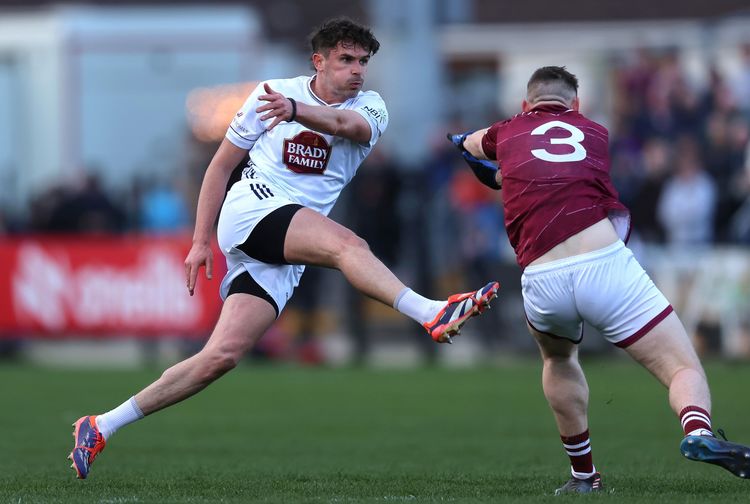Sean O’Driscoll, author of "The Accidental Spy."
Page Turner / Edited by Peter McDermott
“So, where do ya wanna begin?”
The words came from David Rupert, sitting on his living-room sofa in a state that the FBI doesn’t want revealed. He was talking to County Clare-born author Sean O’Driscoll, who went on to write “The Accidental Spy.”
Four journalists before him had begun their work on Rupert’s extraordinary story — about his work for the FBI and MI5 inside militant republican organizations opposed to the peace process in Northern Ireland — and each time the secret agent walked away.
O’Driscoll, however, quickly forged a bond with his future subject. He’d contacted him initially via Michael Gallagher, who headed the Omagh bomb victims’ support group.
“I was surprised when he replied to my query,” the author recalls in his introduction. “He would co-operate with my article on one condition — I should try to get an article in the local newspaper in Madrid [in upstate New York, close to the Canadian border] so that his sisters and friends could read it.
“It was so heartwarmingly parochial a request that I instantly liked him. He had been vilified by defense lawyers as a liar, a philanderer, an opportunist, a snitch, a terrorist and an arsonist, yet he appeared quite a humble man,” O’Driscoll writes.
The journalist set about explaining how this reticent and stoical 6-foot-7 American spy was so easily accepted into republican circles in Ireland.
Certainly, Rupert had a talent for blending in. Later when in Britain for a trial (it didn’t take place in the end because guilty pleas were entered), the FBI agents minding him at a U.S. military base were amazed that he would return with the daily newspaper and discounted American goods from the base’s shopping center; they, having no military ID, were not permitted to go there. The spy, though, had managed a look that suggested a “pompous general in civilian clothes” and upon entering the shopping center he would nod at military police as if they should know him.
O’Driscoll discovered that Joebe, as he was called in Madrid, was the youngest of seven born on a family farm and that he was 6-foot-1 and 270 pounds by age 11. That was in 1962 and, within a few years, he had developed a near-photographic memory and a rebellious streak.
“He organized several sits-ins at the school canteen when the food rations were sparse,” the author writes with regard to the latter trait, “a pragmatic act of defiance for a teenager who weighed twice as much as those around him.”
“David Rupert,” O’Driscoll explained to the Irish Echo, “was an American trucker who met a woman in a bar in Florida. She happened to be in Noraid, the U.S. fundraising wing of the IRA, and introduced him to republicans in Ireland. He started to mix with them more and came to the attention of the gardaí, who passed on his details to the FBI. Eventually, through free trips to Ireland, the FBI turned him and even gave him money to lease a bar along the Irish border, where he would spy.
“After the peace agreement, he moved further and further into dissident circles, eventually becoming a member of the Real IRA army council. He testified against its leader in a Dublin court, putting him away for 20 years and effectively dismantled the organization by naming 100 people involved in dissident republicanism. He also dismantled its U.S. arms and fundraising capability by infiltrating its U.S. fundraising group.”
O’Driscoll seems to be particularly well-qualified to tell this dramatic tale: he has spent 20 years writing about the Real IRA and other such groups and he is also a lawyer.
“I worked as an attorney in New York for the David Bredin Law Firm,” he said. “We handled mostly asylum cases and I was working as a journalist at the same time. The law taught me about economy of words and how best to write an effective argument.”

What is your writing routine? Are there ideal conditions?
I can only write while moving. In New York, that meant getting on the B train and going up to Harlem, then down to Brighton Beach, then up to Harlem and back down to Brighton until I finished. On time, for the Sunday Times, I started at 1 a.m. and came off the train at 5 a.m. to meet a deadline. When I moved back to Dublin, I took that with me. Every word of this book was written on the Luas tram system – going up to the Point Theatre, then back down to Tallaght, then back up to the Point and back down to Tallaght. For variety, I would switch to the new north-south line as well, which was often a lot safer.
What advice do you have for aspiring writers?
Half of the work is finding out who you really are and how your brain operates. It was a painful journey for me to learn that I needed movement to write, I know that there are many others out there who need the same. If you can’t write at home, try a coffee shop, if that doesn’t work, try the subway. I met a journalist from the New York Times who wrote a book on writing and grammar entirely on the subway.
Name three books that are memorable in terms of your reading pleasure.
“Midnight’s Children” by Salman Rushdie; “The Remains of the Day” by Kazuo Ishiguro; “Wild Swans” by Jung Chang.
What book are you currently reading?
“Titanic: Why She Collided” by Senan Molony.
Is there a book you wish you had written?
“The Looming Tower” by Lawrence Wright. How radical Islam emerged in the decades before 9/11. I’ve read it several times and always find new concepts and facts to consider. A great piece of journalism. The same with “Ten Men Dead: The Story of the 1981 Irish Hunger Strike” by David Beresford and “Hitler's Children: The Story of the Baader-Meinhof Gang” by Julian Becker.
Name a book that you were pleasantly surprised by.
“All Souls: A Family Story From Southie” by Michael Patrick McDonald. I didn’t have much hopes for it but then couldn’t put it down. So much of the pain of Irish America is explained in this book, much like “Hillbilly Elegy” is for Ulster Scots
If you could meet one author, living or dead, who would it be?
Billy Collins. I’ve read so much about him, not least in the Irish Echo, and his poetry is so controlled, funny and insightful. I’ve seen every video there is of his readings. He looks like someone with whom you would love to have a beer.
What book changed your life?
“To Kill A Mockingbird” by Harper Lee. I read it at 15. It changed my outlook on what it is to be a man
What is your favorite spot in Ireland?
The Burren in my native Clare.
You're Irish if...
You spend half your time criticizing the Catholic church and light a candle for your family every time you need help.







